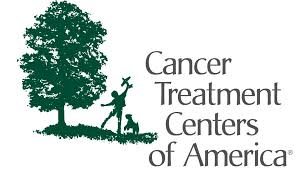Cancer Treatment Centers of America: 800-Pound Marketing Gorilla
By Glenn Sabin

Since 2008 most major business sectors have evolved their business development strategies in response to profound changes in the modern marketing landscape. Curiously and with few exceptions, independent hospitals, hospital systems and large medical institutions remain firmly stuck in the 20th century.
Not so for Cancer Treatment Centers of America (CTCA). In fact, not one national cancer center matches CTCA’s overall aggressive marketing prowess and sophistication. This includes the top National Cancer Institute (NCI) designated comprehensive centers counting MD Anderson, Sloan-Kettering, Dana-Farber and Fred Hutchinson.
However, understanding its significant value, some of the biggest names in medicine have become bona fide publishers by ramping up their media-making capabilities to create useful, relevant content for effectively engaging communities and prospective patients around their brands. Organizations such as Johns Hopkins, Mayo Clinic, Cleveland Clinic and Kaiser Permanente are among the handful of ’brands’ beginning to compete for web audience share with stalwart health media companies such as WebMD.
Back to CTCA. Not only do they understand the core tenets of media-making and content distribution (widely known as content marketing or inbound marketing) for driving significant organic web traffic, you’d have to live under a rock to escape their robust, ongoing television and radio advertising presence. This barely touches on CTCA’s full arsenal of resources, tools, tactics, and strategies used to feed their well-oiled business development machine. We’ll discuss this more later, but for now some important background information.
Who is Cancer Treatment Centers of America?
Founded in 1988 by Richard J. Stephenson following his mother’s death from cancer, and deeply disappointed by the lack of comprehensive care she received at a major cancer center, Stephenson set out to ‘change the face of cancer care’ thorough his organization’s signature Mother Standard® of Patient Empowered Care® program.
A privately owned for-profit company, CTCA has successfully grown from one cancer center into a national network of five hospitals including its headquarters in Zion, Ill. and locations in Tulsa and Goodyear, Ariz., Philadelphia, and Newnan, Ga.
Technologically Advanced
Short of, say, purchasing an extremely expensive proton beam for radiation therapy, CTCA offers state of the art imaging, diagnostics and technology for oncological care, including intraoperative radiation therapy used during surgical procedures. Also, deep tissue hyperthermia paid for out-of-pocket for all but one indication: cervical cancer.
Overall, considering that CTCA is neither NCI designated nor even recognized as a top cancer center in the country, they’ve made a very impressive commitment to medical technology. In terms of operations technology, CTCA runs Lean Six Sigma, a set of advanced tools for process improvement credited with eliminating various types of operational business waste.
Enjoying this article? Subscribe and get our latest, delivered straight to your inbox.
Acclaimed Food Services—Bar None
Arguably featuring the highest quality organically grown food offered at any medical institution in the country, CTCA brings in top chefs to manage their plant-strong food services. Having personally toured their Philadelphia hospital, I can attest to the high bar set by their impressive culinary standards. Medical institutions across the country should take note.
Leveraging Whole Person Cancer Care
CTCA was the country’s first hospital-based cancer center to feature such a comprehensive array of integrative practitioners, including registered dieticians (all patients see a dietician), naturopaths, chiropractors, acupuncturists, psychosocial and psycho-oncology specialists. The company’s success in distinguishing its brand as a ‘destination cancer center’ offering ’whole person care’ is worthy of a “Harvard Business Review” case study. But until “HBR” picks up on this opportunity, I’ll give it some more attention below.
Target Market
As a for-profit hospital network, CTCA selectively decides for whom they will provide care. The organization employs a team of communications degreed ‘Oncology Information Specialists’ well-trained to efficiently gage the economic viability of a prospective client. CTCA only accepts select insurance policies meeting their internal reimbursement requirements.
HMOs and Medicare* are not accepted. The indigent and uninsured are not served.
CTCA does offer prospective patients without approved policies the opportunity to pay cash—typically large sums—in advance of treatment. Given low Medicare and other commercial payer reimbursements, these policies help ensure profitability and set CTCA apart from most large cancer centers.
*CTCA only accepts Medicare for in-state patients at its Newnan, GA location
Fuzzy Math Patient Outcomes Reported
Compared to other institutions, CTCA has been particularly effective at leveraging its impressive patient survival outcomes. But according to a Reuter’s exposé, it appears that CTCA’s self-reported survival statistics were comprised of skewed, self-selected datasets.
Since they do not accept Medicare and Medicaid patients, CTCA serves a younger median age demographic. I believe this alone contributes to their stated higher survival rates. Furthermore, CTCA’s survivorship data may conceivably be superior compared to national averages due in great part to their integrative health clinical and educational services, especially those around behavioral change, i.e., diet, stress reduction and exercise. Considering the attention generated by the Reuters expose, it will be interesting and telling to see if CTCA chooses to make audited survivorship data available in the future.
With the foregoing context in mind, I will share my outsider observations of CTCA’s marketing machine—and how it works to ensure robust clinic utilization across its hospital network.
The 800-Pound Gorilla of Cancer Services Marketing
That the enterprise outspends every major cancer center on the planet in terms of traditional radio and television advertising is just the tip of the iceberg. The breadth and scope of CTCA’s marketing, sales and business development footprint is simply unparalleled.
By highly differentiating its brand and effectively communicating its unique selling proposition, CTCA markets its services nationally, driving new prospects to the closest CTCA hospital. And with five locations, they enjoy the geographic coverage to achieve the economies of scale needed to support its large marketing and advertising spend.
Content Marketing
As previously mentioned, CTCA thoroughly understands the value of consistently creating and distributing high-quality information (content) for engaging prospective patients around its brand. The organization has created a sizable volume of helpful cancer-specific content, as well as custom magazines, articles, videos, and regular news releases to help drive traffic to its website and new patients to its various hospital locations.
Clearly mastering the art of storytelling, especially those involving patients, the company has been deft at creating scores of highly produced patient video testimonials for publication on its website and features within its numerous television ad spots. Nothing compares to descriptive storytelling, especially a highly emotive personal narrative of one’s cancer journey. (click to tweet)
The fact that good outcomes—told by patients aimed at prospective patients—inspire hope is not lost on CTCA.
Digital Marketing
A traditional media advertising juggernaut, CTCA has staked out a similarly aggressive position on the Web. In addition to the firm’s significant organic SEO tactics driven by quality content creation, they also bid heavily on a large number of cancer-specific keywords and phrases via the pay-per-click service, Google AdWords. That’s in addition to an active digital web advertising program that includes buttons, banners and sponsored content.
To give you an idea of the amount of web traffic CTCA drives to their site, following are statistics from Alexa.com, a web traffic monitoring company that ranks websites based on popularity: The smaller the number the more popular the site. For instance, Google.com is the number 1 site in the U.S. (and globally) based on traffic. These positions reflect U.S. rankings as of December 30, 2013.
Alexa.com Rankings
MD Anderson Cancer Center: 14,119
Memorial Sloan-Kettering Cancer Center: 16,865
Cancer Treatment Centers of America: 18,003
Dana-Farber Cancer Institute: 79,774
Given CTCA’s relatively small footprint (even with its five locations), their Alexa web ranking is impressive compared to mammoth cancer institutes like MD Anderson and Sloan-Kettering. CTCA, a much smaller organization, is competing for digital eyeballs with the biggest players in cancer care. The fact that Harvard’s Dana-Farber is ranked so far below the others is surprising, yet instructive. Dana-Farber’s level of digital content creation, coupled with its overarching paid and non-paid digital marketing strategy and execution is not as robust and effective as MD Anderson and Sloan-Kettering—it’s core competitors.
Enjoying this article? Subscribe and get our latest, delivered straight to your inbox.
Sponsorships + Relationship Marketing
CTCA has been quite adroit with its decisions surrounding sponsorships, partnership marketing opportunities and media underwriting programs. Targeting well-educated and primarily affluent individuals, the enterprise has been underwriting National Public Radio. A key example of their forward-leaning approach to breaking through the crowded media landscape is CTCA’s major sponsor status of documentarian Ken Burns’ “Cancer: The Emperor of All Maladies”. When PBS airs this three-part, six hour quality program in 2015, CTCA will enjoy terrific brand exposure to a mostly well-educated and affluent viewership around its primary keyword: ‘cancer’.
As another example, this past fall CTCA entered into a partnership agreement with the U.S. Hispanic Chamber of Commerce (USHCC), a national network comprising over 200 local Hispanic chambers of commerce and over three million Hispanic-owned businesses. Although the exact terms and deliverables of the partnership were undisclosed, it’s clearly evident that CTCA understands changing demographics and the inherent power of engaging an affluent national community of Hispanic business owners with the importance of cancer screenings and treatment.
CTCA is a ‘Visionary Level’ sponsor of Stand Up To Cancer, an ‘Impact Partner’ of Stupid Cancer. This organization is dedicated to supporting young adults with cancer and enjoys media and sponsorship relationships with several other influential organizations across the country. Not surprisingly, it appears that CTCA has positioned themselves with category exclusivity in most of these agreements as ‘the’ cancer center sponsor.
Creating new and direct pathways to build clinic utilization across its hospital network, CTCA invests heavily in the necessary human resources for identifying, growing and nurturing strategic relationships with employers, associations and insurers across key industries.
Consumer (Patient) Referral Program
CTCA promotes a membership-based patient loyalty marketing program to help activate the oldest and, still, most effective low tech marketing tool ever designed: word of mouth referrals.
Here’s unedited CTCA recruitment ad copy for a recently posted Loyalty Marketing Coordinator position:
“The Loyalty Marketing Coordinator supports the Loyalty Marketing Specialists and Market Development Manager, who is responsible for sustaining patient commitment and loyalty to CTCA. The Loyalty Marketing Coordinator establishes and maintains a membership base that motivates patients to engage and refer patients to CTCA. The Loyalty Marketing Coordinator assists with the innovative programs that captures interest, provides value, and delivers commitment from CTCA’s patient and caregiver base. The Loyalty Coordinator reports to the Market Development Manager.”
24/7/365 Customer Service
Sure, you can send an email around the clock to any of the major cancer centers, but don’t expect a quick response outside normal business hours. Have questions about a loved one just diagnosed with cancer? You can reach operators directly by phone to discuss the situation and get an appointment … so as long as it’s during “normal” business hours.
However, CTCA offers 24/7/365 customer service by phone and round-the-clock online and video chats. Cancer doesn’t sleep, nor does CTCA’s inbound customer service team manned by highly trained communication professionals ready to assist, assess and efficiently advance the new patient recruitment and registration process.
A 35,000 Foot View
As an outside observer who’s often admired CTCA’s growing marketing and sales prowess from afar over the past several years, I currently have no relationships within the entity’s executive marketing staff, nor have I interviewed anyone at CTCA in preparation of this article. The organization is a privately held for-profit keeping their growth strategy close to its vest.
What I’ve covered here is just a sampling of the core business development and marketing activities I see supporting CTCA’s exponential growth trajectory. Though I’ve observed even more regarding the organization’s advertising processes, brand communication efforts and market insight gathering activities, I want to avoid making this long post even longer! Thus, I’ll wrap it up with the following:
In Summary
While certainly not perfect, CTCA has done an impressive job positioning itself as a destination cancer center on par with the leading major national cancer institutions. Unlike most of its larger and smaller competitors, CTCA has carved out a unique selling proposition around ’whole person care’ allowing the enterprise to highly differentiate its brand.
As a privately held for-profit company, it’s largely been able to control with whom it works and serves, eliminating unprofitable patient encounters. As a savvy marketer that understands how to leverage modern business development and communications strategies, CTCA has sharpened its competitive edge against the field’s largest players. Looking at CTCA’s leadership team comprised of executives boasting significant business development success both within and outside of hospital healthcare, one can surmise that even grander expansion plans are in store for the organization.
It’s important for cancer clinics and centers to understand that while mass market national television and radio advertising buys are costly, most of the technology, tools and processes CTCA has leveraged to grow its enterprise are inexpensive and readily available to much smaller organizations.
CTCA may be the David to MD Anderson’s and Sloan-Kettering’s Goliath; it has developed into an aggressive but still nimble competitor continually chipping away market share from the large national institutions as well as the local communities they serve. There are vital lessons herewith to be learned.
Smaller cancer clinics and centers offering medical oncology and radiation oncology services, especially those involved in integrative oncology, should pay close attention to how CTCA approaches its business and learn to emulate and apply certain aspects of its playbook within their own respective geographic markets.
Even with reductions in reimbursements and the other significant challenges to the delivery of cancer line services, growth opportunities remain for clinics and centers of varying size and scope that are willing to reassess their patient care approach and business development activities.
About FON
FON is a leading integrative health and medicine business development and strategy consulting firm. FON specializes in custom solutions for growing patient volume, developing programs, and increasing product sales. Our practical business models are driven by innovative marketing, clear messaging, and customer engagement via branded storytelling.
Contact us today to schedule a complimentary 30-minute consultation to discuss your business development or personal brand needs.

Read Glenn’s story.





















